外研版初三英语上册 Module 4 重点难点易错点整理
- 格式:doc
- 大小:47.00 KB
- 文档页数:5

外研九年级上m 4 知识点外研九年级上m4知识点外研九年级上的Module 4主要涉及了英语语法、词汇和阅读理解等方面的知识点。
本文将对这些知识点进行详细的介绍和解析。
一、语法知识点1. 过去完成时:过去完成时是指在过去某个时间之前已经发生的动作或存在的状态。
它的形式是had+过去分词,通常与表示一段时间的状语连用。
例如:By the time she arrived, we had already finished the work.(她到达时,我们已经完成了工作。
)2. 现在完成时与过去完成时的区别:现在完成时强调与现在的关系,通常与表示到目前为止的时间状语连用;而过去完成时强调与过去的关系,通常与表示过去某个时间点的状语连用。
3. 虚拟语气:虚拟语气用来表示假设、愿望、建议等非真实的情况。
常见的虚拟语气形式有:would/should/could/might+动词原形;had+n.(过去完成时)+动词过去分词;如果从句中主语与谓语动词之间是be动词,常使用were来表示虚拟语气。
二、词汇知识点1. 单词拼写:学习英语单词时,正确的拼写是非常重要的。
在Module 4中,我们需要注意一些常见的单词拼写,例如:convenience、comparison、ascent等。
2. 同义词辨析:在学习英语时,我们经常会遇到一些同义词,需要注意它们的细微差别。
例如:begin/start、happen/occur、choose/select等。
3. 词性转换:同一个词可以根据用法和意义的不同,变换成不同的词性。
例如:adjective→adverb(slow→slowly)、verb→noun (decide→decision)等。
三、阅读理解知识点1. 阅读技巧:在做阅读理解题时,我们需要注意一些阅读技巧。
例如,首先快速浏览全文,了解文章的大意;然后仔细阅读每个段落,注意关键词和句子;最后根据问题和选项,选择正确的答案。
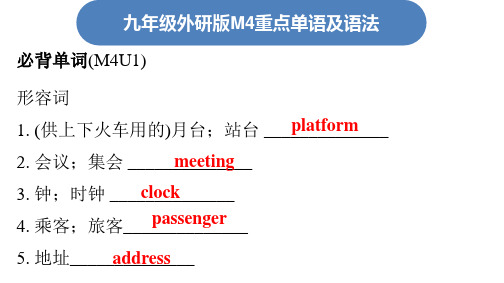

Module 4 Home alone短语归纳1.look after照顾2.be careful with /of小心(对待).......3.make sure确保4.plenty of许多,大量5. cook simple meals 做简单的饭菜6. wake up醒;醒来7. be about to do sth. 将要/打算做某事8. have a good trip 旅途愉快9.a couple of两个,几个 10.turn off关掉;关闭(设备)turn on 打开11. sb. be/feel bored with sth. 某人对某事感到厌烦12. come true实现 13.be worried about= worry about担心14. on business出差 15. at last最后;终于16. have fun玩得高兴17.as soon as一......就...... 18. hurry to do sth. 匆忙做某事19. ask sb. for sth.向某人要某物20. hand in上交 21. be unable to do sth.不能做某事22. feel tired and sleepy 感到又累又困 23. help sb. with sth. =help sb. (to) do sth. 24. tidy up收拾;整理 25. plan to do sth. 计划/打算做某事26. depend on依靠;依赖 ;取决于 27. say goodbye to sb.和某人道别28. see sb. off送别某人 29. be busy doing sth. be busy with sth.26. be /get ready for sth. 为某事准备好be/get ready to do sth. 准备好做某事27. get sth. ready 把某物准备好 We must get dinner ready. The guests are coming.28. in a hurry 匆忙 hurry up 赶快29. by accident= by chance 意外地,偶然地30. later on 以后,后来 31. take away 拿走,带走32. in danger 处于危险中33. all day long整天 34. point out 指出 35. call the police 报警36. clean up 清理 37. fight with 与……打架用法集萃1. so+be动词/助动词/情态动词+主语........也是如此2. so+形容词/副词+that从句如此......以至于3. lots of+可数名词复数/不可数名词许多......4. advise sb. to do sth.建议某人做某事5. be about to do sth.即将做某事6.want to do sth.想要做某事7. a bit+形容词/副词有点.....8. have to do sth.不得不做某事 9. a few+可数名词复数几个......10.be unable to do sth.不能做某事 11. try to do sth.设法做某事12. want sb to do sth.想让某人做某事 13. start to do sth.开始做某事14. be happy to do sth.做某事很高兴 15. tell sb. to do sth.告诉某人做某事16. learn to do sth.学会做某事 17. be busy doing sth.忙于做某事Module 4基础知识归纳一、重点词汇1. ________ n.会议;集合2. _________ 关上3. ________ 锁,锁住4. ________ 任何人5. _________ 钟6. ________鸣响;发出铃声7. ________ 乘客8. __________ n.地址;演说9. _________ 文本10. ________ 一对11. _________ 命令;指示12. _________ 工作13. _________ 空的14. _________ 胃;腹部15. ________同班同学16. __________(使)烧焦17. __________ 杯子18.________简单的,容易的19._________任务;工作20.__________我们自己二、重点短语1. _______ up 醒来,唤醒2.wake sb._______把某人叫醒3.text ________ 短信息4. make _______ 确保5. _____ of/ ______ of 许多6. a _______ of 一对7. turn _____ 把…...关掉8. come________ 变成现实9. be _______ about 担心10.on _________ 出差11. _______ _______ 最后12. _______ up 整理,收拾;归置13. be ______ to不能14. be ______ ____ 擅长15.____ time按时16. feel _____ _____对……感到不高兴17.help sb.(to) ______sth./help sb.______ sth.帮某人做某事18. _______ on 依靠,决定于19. ______ _______ to 向某人说再见20. _______up 打扫;整理;梳洗21. not… _______ _______ 根本不……. 22. see sb. _______ 为某人送行23._______ with 和某人打架24. take _______ 拿走25. in _________ 在危险中,有…….的危险26. point ______ 指出;指明27. be ________ to do很高兴做某事三、必会语法1. Beijing has _______ many buses that there is often a traffic jam in rush hours.A. soB.veryC. tooD. such2. _____ it got dark, they worked hard there .A. ThoughB. IfC. SinceD. Because3. I felt so ______(bore)because the film is too________ (bore).4. My clock rings so _______ (loud) that I can even hear it downstairs.5.妈妈经常早晨叫醒我。


知识图谱Module 4 Home alone知识精讲一、必背词汇platform [ˈplætfɔ:m]n. (供上下火车用的)月台,站台meeting [ˈmi:tɪŋ]n. 会议,集会miss [mɪs]v. 未出席,未出现shut (shut, shut) [ʃʌt]v. 关上,合上lock [lɒk]v. 锁,锁住simple [ˈsɪmpl]adj. 简单的,容易的anybody [anybody] pron. 任何人clock [klɒk]n. 钟,时钟ring (rang, rung) [rɪŋ]v. 鸣响,发出铃声passenger [ˈpæsɪndʒə]n. 乘客,旅客address [əˈdres]n. 地址text [tekst]n. 文本,正文couple [ˈkʌpl]n. 一对,两个actually [ˈæktʃuəli]adv. 事实上manage [ˈmænɪdʒ]v. 管理,支配unhappy [ʌnˈhæpi]adj. 不高兴的order [ˈɔ:də]n. 命令,指示business [ˈbɪznəs]n. 工作sofa [ˈsəʊfə]n. (长)沙发snack [snæk]n. 点心,小吃midnight [ˈmɪdnaɪt]n. 午夜,子夜empty [ˈempti]adj. 空的unable [ʌnˈeɪbl]adj. 不能做某事的burn (burned /burnt, burned /burnt) [bɜ:n]v. (使)烧焦,(使)烤糊cup [kʌp]n. 杯子,一杯饮料task [tɑ:sk]n. 任务,工作二、重点词汇1. miss [mɪs]v.1). to fail to do or experience something, often something planned or expected, or to avoid doing orexperiencing something未做到;未体验;避开;幸免于例句:I missed the start of the class because my bus was late.我没有赶上考试开始,因为我坐的公共汽车晚了。
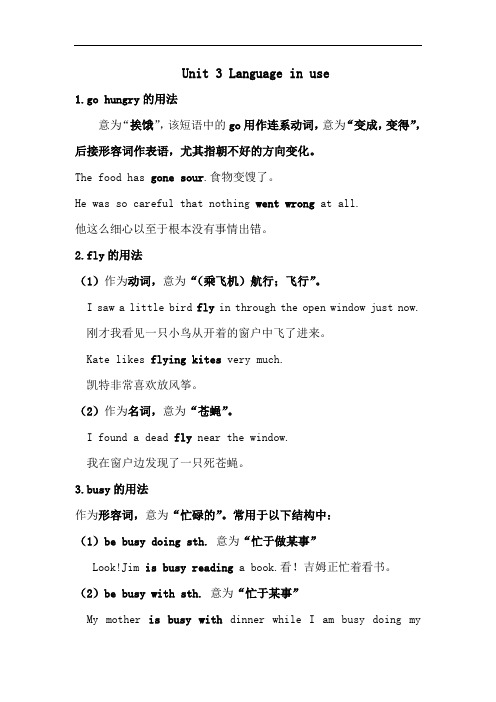
Unit 3 Language in use1.go hungry的用法意为“挨饿”,该短语中的go用作连系动词,意为“变成,变得”,后接形容词作表语,尤其指朝不好的方向变化。
The food has gone sour.食物变馊了。
He was so careful that nothing went wrong at all.他这么细心以至于根本没有事情出错。
2.fly的用法(1)作为动词,意为“(乘飞机)航行;飞行”。
I saw a little bird fly in through the open window just now. 刚才我看见一只小鸟从开着的窗户中飞了进来。
Kate likes flying kites very much.凯特非常喜欢放风筝。
(2)作为名词,意为“苍蝇”。
I found a dead fly near the window.我在窗户边发现了一只死苍蝇。
3.busy的用法作为形容词,意为“忙碌的”。
常用于以下结构中:(1)be busy doing sth. 意为“忙于做某事”Look!Jim is busy reading a book.看!吉姆正忙着看书。
(2)be busy with sth. 意为“忙于某事”My mother is busy with dinner while I am busy doing myhomework.我妈妈正忙着准备晚餐,而我正忙着写家庭作业。
4.tidy的用法(1)作为动词,意为“使整洁/齐;整理”。
常用于tidy up短语中,意为“收拾;整理”,该短语为“动词 + 副词”型结构,故当其宾语为名词时,名词位于副词up前后均可;当宾语为代词时,只能位于tidy和up两词之间。
-Tom,your bedroom is in a mess.Please tidy it up.-汤姆,你的卧室一片凌乱,请把它整理一下。


Module 4【重点单词】1.platform [ˈplætfɔ:m] n. (供上下火车用的)月台,站台2.meeting [ˈmi:tɪŋ] n. 会议,集会3.miss [mɪs] v. 未出席,未出现4.shut (shut, shut) [ʃʌt] v. 关上,合上5.lock [lɒk] v. 锁,锁住6.simple [ˈsɪmpl] adj. 简单的,容易的7.anybody [ˈenibɒdi] pron. 任何人8.clock [klɒk] n. 钟,时钟9.ring (rang, rung) [rɪŋ] v. 鸣响,发出铃声10.passenger [ˈpæsɪndʒə] n. 乘客,旅客11.address [əˈdres] n. 地址12.text [tekst] n. 文本,正文13.couple [ˈkʌpl] n. 一对,两个14.actually [ˈæktʃuəli] adv. 事实上15.manage [ˈmænɪdʒ] v. 管理,支配16.unhappy [ʌnˈhæpi] adj. 不高兴的17.order [ˈɔ:də] n. 命令,指示18.business [ˈbɪznəs] n. 工作19.sofa [ˈsəʊfə] n. (长)沙发20.snack [snæk] n. 点心,小吃21.midnight [ˈmɪdnaɪt] n. 午夜,子夜22.empty [ˈempti] adj. 空的23.unable [ʌnˈeɪbl] adj. 不能做某事的24.burn (burned/burnt, burned/burnt) [bɜ:n] v. (使)烧焦,(使)烤糊25.cup [kʌp] n. 杯子,一杯饮料26.task [tɑ:sk] n. 任务,工作【重点短语】1.look after 照顾;照看2. make sure 确信;确保3. plenty of 很多;大量的4. wake up醒来5. so... that... 如此……以至于……6. advise sb. to do sth. 建议某人做某事7. be about to将要,正打算;即将;就要8. send sb. sth./send sth. to sb. 送给某人某物9. at a meeting 在会议上10. a bit unhappy有点儿不开心e true 实现12.on business 出差13.hand in上交14.tidy up整理,收拾15. be able to能够……16. be busy doing... 忙于做……17. get ready准备好18. fight with用(某种武器)与(某人)交战;用(某种方式、手段)反对(某人)19. be in a hurry立刻20. later on以后;后来21. in danger在危险中22. point out 指出;指明23. be worried about 担心【重点句型】1. I can look after myself, although it won’t be easy for me.虽然对我来说并不容易,但我能照顾我自己。

Module 4 Home alone重要知识点讲解Unit 1一、重点短语be careful with 小心(对待);注意look after 照顾;照看make sure 确保;设法保证plenty of 许多;大量;充分的wake up 叫醒;喊醒;使...醒来advise sb to do sth.建议某人做某事be about to do sth.即将做某事send sb a text message 给某人发短信have a good trip 旅途愉快a couple of 两个;少数几个二、So am I[点拨](1)英语中在表示“某人/物和……一样”时(表肯定),常用“so+情态动词/助动词/系动词+另一个主语”,常翻译为“……也……”或“……也是”,主语不是同一人或物。
Tom is a student, so is Lingling.汤姆是一名学生,玲玲也是。
(2)表示“某人/物一样不……”时(表否定),常用“neither/nor+情态动词/助动词/系动词+另一个主语”,常翻译为“……也不……”或“……也不”,主语不是同一人或物。
Sally can't play the violin, neither/nor can I.萨利不会拉小提琴,我也不会。
(3)“so+主语+助动词/情态动词/系动词”则表示“……确实是这样”,主语是同一个人或物。
--Tom was late this morning. ---So he was. ——汤姆今天早上迟到了。
——他确实迟到了。
三、so ... that “如此……以至于”[点拨]“so+形容词或副词+that ...”引导结果状语从句。
The boy is so young that he can't look after himself.这个小男孩太小了以至于他无法照顾好自己。
He was so late that he missed the early train. 他如此的迟以至于错过了早车。
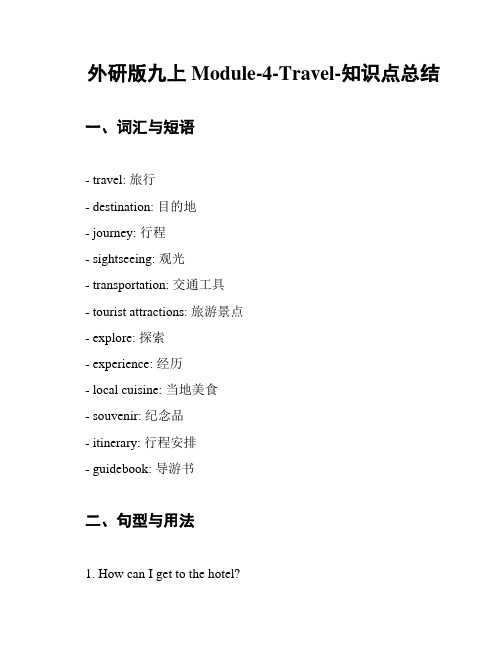
外研版九上Module-4-Travel-知识点总结一、词汇与短语- travel: 旅行- destination: 目的地- journey: 行程- sightseeing: 观光- transportation: 交通工具- tourist attractions: 旅游景点- explore: 探索- experience: 经历- local cuisine: 当地美食- souvenir: 纪念品- itinerary: 行程安排- guidebook: 导游书二、句型与用法1. How can I get to the hotel?我怎样才能到达酒店?2. I want to book a flight to Paris.我想预订往返巴黎的机票。
3. What are the must-see attractions in this city? 这个城市有哪些必看的景点?4. How long does it take to get to the airport? 去机场需要多长时间?5. I'm interested in local culture and history.我对当地文化和历史很感兴趣。
6. We had a great time exploring the old town. 我们在古城探索期间玩得很开心。
7. The hotel provides free Wi-Fi and breakfast. 酒店提供免费的无线网络和早餐。
三、文化背景知识- Paris is famous for its romantic atmosphere and iconic landmarks, such as the Eiffel Tower and Louvre Museum.- Traditional Chinese cuisine is known for its diverse flavors and regional specialties, such as Peking duck and Sichuan hot pot.- Many countries have their own traditional dances, such as the Flamenco in Spain and the Samba in Brazil.四、小结本模块主要介绍了旅行相关的词汇与短语,以及一些常用句型与用法。
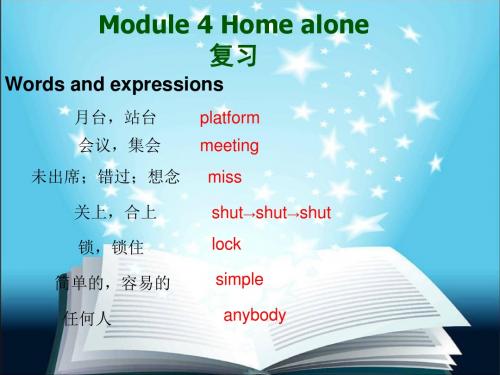

九上M4 Home alone一、课内基础必背单词platform [ˈplætfɔ:m] n. (供上下火车用的)月台,站台meeting [ˈmi:tɪŋ] n. 会议,集会miss [mɪs] v. 未出席,未出现shut (shut, shut) [ʃʌt] v. 关上,合上lock [lɒk] v. 锁,锁住simple [ˈsɪmpl] adj. 简单的,容易的anybody [anybody]pron. 任何人clock [klɒk] n. 钟,时钟ring (rang, rung) [rɪŋ] v. 鸣响,发出铃声passenger [ˈpæsɪndʒə] n. 乘客,旅客address [əˈdres] n. 地址text [tekst] n. 文本,正文couple [ˈkʌpl] n. 一对,两个actually [ˈæktʃuəli] adv. 事实上manage [ˈmænɪdʒ] v. 管理,支配unhappy [ʌnˈhæpi] adj. 不高兴的order [ˈɔ:də] n. 命令,指示business [ˈbɪznəs] n. 工作sofa [ˈsəʊfə] n. (长)沙发snack [snæk] n. 点心,小吃midnight [ˈmɪdnaɪt] n. 午夜,子夜empty [ˈempti] adj. 空的unable [ʌnˈeɪbl] adj. 不能做某事的burn (burned /burnt, burned /burnt) [bɜ:n] v. (使)烧焦,(使)烤糊cup [kʌp] n. 杯子,一杯饮料task [tɑ:sk] n. 任务,工作必背短语text message 短信 a couple of 两个turn off 关掉,关闭(设备)be worried about 担心on business 出差wake up 醒,醒来hand in 提交,上交all day long 整天重点词句1.【课文原句】It’s leaving from platform2.【用法】本句是现在进行时表将来。

Module 4♦重点词汇1.meeting n.会议;集会have a meeting 开会2.miss v.未出席;未出现missing adj.找不到的;丢失的3.shut(shut,shut) v.关上;合上4.lock v.锁;锁住n.锁5.ring(rang,rung) v.鸣响;发出铃声6.address n.地址7.text n.文本;正文text massage 短信8.couple n.一对;两个a couple of 两个;几个9.manage v.管理;支配manager n.经理management n.经营;管理10.unhappy adj.不高兴的happy adj.高兴的11.order n.命令;指示12.business n.工作businessman n.商人on business出差13.midnight n.午夜;子夜at midnight 在午夜14.empty adj.空的15.unable adj.不能做某事的be unable to do sth.不能做某事16.burn(burned/burnt,burned/burnt) v.(使)烧焦;(使)烤糊17.fight with 与……打架18.be careful with/of小心(对待)……19.make sure确保20.wake up醒;醒来21.be about to do sth.将要/打算做某事22.have a good trip 旅途愉快23.turn off关掉;关闭(设备)turn on 打开turn up(将音量等)调大turn down(将音量等)调小;拒绝e true实现25.be worried about=worry about担心26.at last最后;终于27.hurry to do sth.匆忙做某事in a hurry 匆忙hurry up 赶快28.hand in上交29.tidy up收拾;整理clean up清理30.plan to do sth.计划/打算做某事31.say goodbye to sb.和某人道别see sb.off送别某人32.be busy doing sth.忙于做某事be busy with sth.忙于某事33.be/get ready for sth.为某事准备好be/get ready to do sth.准备好做某事get sth.ready 把某物准备好34.by accident=by chance 意外地,偶然地ter on以后;后来36.take away 拿走;带走37.in danger 处于危险中out of danger 脱离危险38.all day long整天39.point out 指出♦重点句型1.So am I,but I can’t miss two weeks of school.我也是(很遗憾),但是我不能两周不上课。
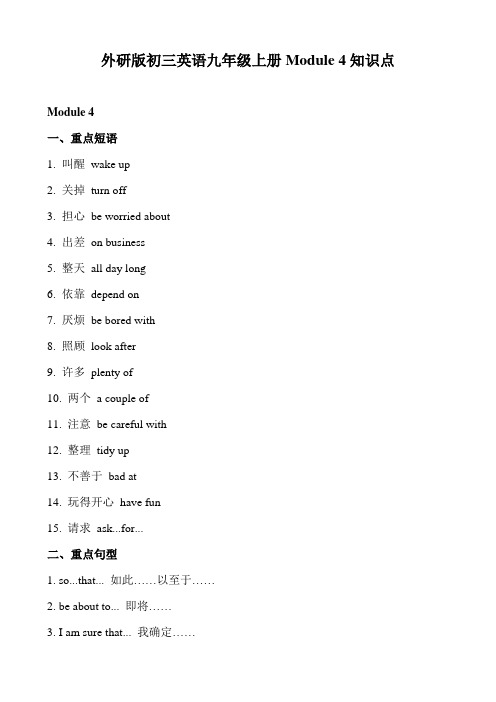
外研版初三英语九年级上册Module 4知识点Module 4一、重点短语1. 叫醒wake up2. 关掉turn off3. 担心be worried about4. 出差on business5. 整天all day long6. 依靠depend on7. 厌烦be bored with8. 照顾look after9. 许多plenty of10. 两个a couple of11. 注意be careful with12. 整理tidy up13. 不善于bad at14. 玩得开心have fun15. 请求ask...for...二、重点句型1. so...that... 如此……以至于……2. be about to... 即将……3. I am sure that... 我确定……4. unable to do... 不能做三、重点语法so...that...意为“如此……以至于……”,so 后接形容词或副词的原级,表示程度,that 引导的是结果状语从句,例如:He has so many friends here that he doesn’t feel lonely at all.在这儿他有很多朋友以至于他一点也不感到孤独。
although / though 作连词,意为“虽然;尽管;然而”,引导让步状语从句,例如:I exercised for half an hour though I was a little bit tired today.尽管我今天有点累,我还是锻炼了半个小时。
Although / though 引导让步状语从句时,不能与but 同时使用,但可以与yet, still 连用。
记课堂笔记的小技巧1、不要记得太紧太密,每页右边留下约1/3的空白处,以便日后补充、修改。
2、用词用语要简洁浓缩,常用词语可用代号。
3、写字要快、字迹不必要求太高,看清就行。

外研版初三上册Module4知识点一:现在举行时表示将来:当表示筹划好或准备要做某事时,可用现在举行时表示将来例:Jim is going boating this afternoon。
吉姆本日下午要去划船Are they all coming tomorrow?他们明天都要来吗?例:Dad ______the USA in two weeks .A, is leave for B, leaves for C, is leaving for D, left for二,so 引导的倒装句So+be动词/助动词/情态动词+主语:表示火线所说的环境也适用于另一个别或物be动词/助动词/情态动词,要和前一句的谓语动词保持一致。
此处的so 和副词“这样,这么”及连词“因此,所以”不同,在这个句型中,so 常用来取代上文中的形容词,名词,或动名词,表示赞同。
例:She is an English teacher .So am I .He can swim ,and so can I.例:Sandy likes English best .She reads the texts every day .A, So does Jim B, So Jim does C, So Jim is D, So is Jim三:so +主语+谓语和so +谓语+主语的区别:当两个句子指的是两个别时,so 后句子用倒装例:He is a student .So am I .他是一个学生。
我也是。
当两个句子指的是联合个别时,so 后句子不倒装。
例:Lucy likes dark blue . So she does .路西喜欢深蓝色。
确实云云。
例:______exciting news it is ! Disneyland in Shanghai has opened to the public!_______.We plan to go there this summer holiday.A, What an ; So is it . B, What ;So it is . C, How ;So it is . D, How; So is it .四,as 和like 作介词的用法As 用作介词,“作为,看成”例:I found a job as a guide .Like 用作介词,like 前边一般要有be 动词,翻译为“像。
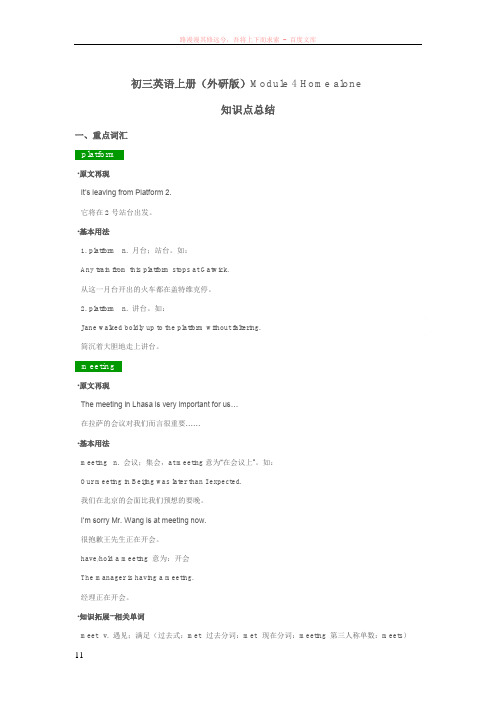
初三英语上册(外研版)Module 4 Home alone知识点总结一、重点词汇platform·原文再现It’s leaving from Platform 2.它将在2号站台出发。
·基本用法1. platform n. 月台;站台。
如:Any train from this platform stops at Gatwick.从这一月台开出的火车都在盖特维克停。
2. platform n. 讲台。
如:Jane walked boldly up to the platform without faltering.简沉着大胆地走上讲台。
meeting·原文再现The meeting in Lhasa is very important for us…在拉萨的会议对我们而言很重要……·基本用法meeting n. 会议;集会,at meeting意为“在会议上”。
如:Our meeting in Beijing was later than I expected.我们在北京的会面比我们预想的要晚。
I’m sorry Mr. Wang is at meeting now.很抱歉王先生正在开会。
have/hold a meeting 意为:开会The manager is having a meeting.经理正在开会。
·知识拓展--相关单词meet v. 遇见;满足(过去式:met 过去分词:met 现在分词:meeting 第三人称单数:meets)meet with. “遇到;碰到”强调偶然性;还常表示“遭遇;经历;遭到”。
I met with a childhood friend on the bus.我在汽车上遇到一个儿时的朋友。
They met with an accident on their way back.他们在回去的路上遇到车祸。

2. so...that与such... that引导结果状语从句
such是形容词,so是副词。
so…that用于以下四个句型:
(1)so+形容词/副词+that…
This teacher is so kind that we all like him. 这个老师非常和谒,我们都喜欢他。
(2)so+形容词+a/an+单数可数名词+that…
This is so interesting a book that we all enjoy reading it. 这本书非常有趣,我们都喜欢看。
(3)so+ many(多) / few(少) +复数可数名词+that…
He has so many books that I can’t count them. 他有很多书,我数也数不清。
(4)so+ much(多) /little(少) +不可数名词+that…
There was so much food that we couldn’t eat it all. 食物太多了,我们吃不完。
注:若little表示“小”时,要用such。
如:
He is such a little boy that he can’t lift the box. 他是这么小的小男孩,提不动那个箱子。
such…that…用于以下三个句型:
(1)such+ a/an+形容词+单数可数名词+that…
This is such an interesting book that we all enjoy reading it. 这本书非常有趣,我们都喜欢看。
(2)such+形容词+复数可数名词+that…
They are such interesting books that we all enjoy reading them. 这些书很有趣,我们都喜欢看。
(3)such+形容词+不可数名词+that…
It is such nice weather that I would like to go to the beach. 天气如此之好,我想去海滩。
【即学即练】
1.The teacher told us _______funny story ________we all laughed.
A. such a ,that
B. such, that
C. so a, that
D. so, that
2.The workers work _____hard _______they don’t have a day off even
on the weekend.
A. too, that
B. such, that
C. so, that
D. as, that
3.There is _______much bird food _______it can last for two months.
A .such, that B. so, that C. such a, that D. so, to
用so…that…或者such…that…填空:
1.It was ______ hot in the cinema ______ I felt very uncomfortable.
2.It was _______ a funny film ______ I laughed until I cried!
3.______ few people came to see the film ___ the manager put on another film instead.
4.Tom hurt his legs ______ badly _____ he was not able to walk for six months.
5.There were ______ many people at the party _____our house got too crowded.
6.Joy has ______ a strong love of films _____ she goes to the cinema every week.
答案:1-3 ACB
1. so...that
2. such...that
3. so...that
4. so...that
5. so...that
6.such...that
二、让步状语从句
1. though, although
注意:当有though, although时,后面的从句不能有but,但是though 和yet可连用
Although it's raining, they are still working in the field.虽然在下雨,但他们仍在地里干活。
He is very old, but he still works very hard.虽然他很老,但仍然努力地工作。
Though the sore be healed, yet a scar may remain.伤口虽愈合,但伤疤留下了。
(谚语)
【即学即练】___she is young, she knows quite a lot.
A. When
B. However
C. Although
D. Unless
答案:C。
意为虽然她很年轻,却知道许多。
2.ever if, even though.即使
We'll make a trip even though the weather is bad.
3.whether…or-不管……都
Whether you believe it or not, it is true.
4."no matter +疑问词" 或"疑问词+后缀ever"
No matter what happened, he would not mind.
Whatever happened, he would not mind.
替换:no matter what = whatever no matter who = whoever no matter when = whenever no matter where = wherever no matter which = whichever no matter how = however
注意:no matter 不能引导主语从句和宾语从句。
(错)No matter what you say is of no use now.
(对)Whatever you say is of no use now.
你现在说什么也没用了。
(Whatever you say是主语从句)
(错)Prisoners have to eat no matter what they're given,
(对)Prisoners have to eat whatever they're given.囚犯们只能给什么吃什么。
常考点+
例题分析
易错点+ 例题分析考法1单词拼写
1.We should be ___________(小心) when we do our homework.(根据句意及汉语提示写出单词) 考法2短语运用
2.这对新人相爱多年,今天终成眷属。
真好!(根据汉语意思完成句子)
The new couple_____with each other for many years and they are finally getting married today. How nice!
考法3动词短语辨析
3.What's wrong with you, Eric? You look tired
I ________to prepare for the final exam last night
A picked up
B woke up C. put up D. stayed up
4. The boy is sleeping. Please_________the radIo
A. turn up
B. turn off C turn on
考法4倒装句式
4.-Taian is a really comfortable city to live in
________,and it's world-famous for Mount Tai
A. So it is
B. So is it
C. So it do
D. So does it
6.I was busy so I didn’t look______the news
______We can ask Ms Li about it.
A after; I didnt, too B.at: Either did I C through; Neither did I D like: So did I
考法5动词不定式的否定形式
7. The doctor advised my father ________( not smoke) any more.(用所给词的适当形式填空) 解析
1.careful
2. have been in love 3-6 DBAC 7.not to smoke。